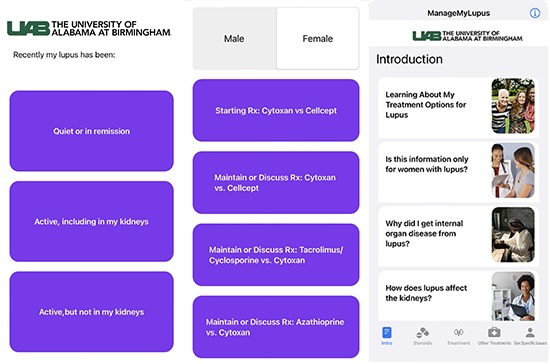 The MyLupus app is a patient-friendly, patient-focused decision-aid tool for people from all backgrounds with moderate to severe lupus.Ninety percent of patients with lupus are female, and studies show it is the fifth leading cause of death in Black females ages 15-24. While the chronic autoimmune disease does not have a cure, patients can work with medical specialists to manage the disease and live a relatively full life.
The MyLupus app is a patient-friendly, patient-focused decision-aid tool for people from all backgrounds with moderate to severe lupus.Ninety percent of patients with lupus are female, and studies show it is the fifth leading cause of death in Black females ages 15-24. While the chronic autoimmune disease does not have a cure, patients can work with medical specialists to manage the disease and live a relatively full life.
The University of Alabama at Birmingham launched the MyLupus app to inform patients about their disease and symptoms and assist them when working with medical professionals. The free app is the latest advancement stemming from a multicenter, randomized trial funded by the Patient-Centered Outcomes Research Institute.
The app is a culmination of a decade’s worth of work in developing and implementing a computerized decision-aid system. Results from the trial showed that patients made better-informed decisions when using a computerized system.
“For many patients, lack of knowledge about lupus and their treatment options often interferes with their decision-making process,” said Jasvinder Singh, M.D., professor of medicine in the UAB Division of Clinical Immunology and Rheumatology and principal investigator of the study. “We wanted to take our computerized system and make it more accessible to lupus patients, which led us to create a free, phone-based app.”
 The MyLupus app is a patient-friendly, patient-focused decision-aid tool for people from all backgrounds with moderate to severe lupus. The app provides information about the disease, treatment options and how to live a healthy lifestyle with lupus. Information is further broken down by age, sex and race.
The MyLupus app is a patient-friendly, patient-focused decision-aid tool for people from all backgrounds with moderate to severe lupus. The app provides information about the disease, treatment options and how to live a healthy lifestyle with lupus. Information is further broken down by age, sex and race.
“Patient education and empowerment are critical for early treatment access,” Singh said. “Lupus is not a one-size-fits-all disease, and studies have shown that minorities, specifically minority females, are more likely to have severe lupus and life-threatening complications.”
The UAB team, along with 18 universities and four clinical sites, worked alongside lupus patients to create an app tailored to them. It was an iterative process that relied on cross-collaboration to incorporate patient feedback and lupus knowledge into a one-stop-shop platform.
Singh and co-principal investigator and UAB Professor Emeritus Winn Chatham, M.D., used their expertise in lupus research and patient care to determine what resources and information were needed in the decision-aid. The UAB team also included Larry Herald, Ph.D., associate professor in the Department of Health Services Administration who led the implementation aspects of the study, and Christopher Russo, a former UAB computer science and art studio student who migrated the system to the phone-based platform.
For more information about UAB Medicine’s lupus and rheumatology services, click here.
Moving forward, Singh and his team hope to see the app offered in additional translations and used in health care systems and practices across the United States.
“Our hope for the future of this app is that every patient with lupus in the United States and in the world can use it to access this information and make the best treatment decisions for their lupus, as informed partners with their provides, in a true sense of shared decision-making for their health,” Singh said. “We are confident that review of this app before and after the clinic visit will lead to meaningful dialogue between the patient and the provider. The app is a tool that every lupus patient can easily understand regardless of their education level or health literacy level.”